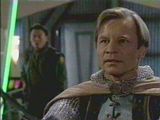

Contents: Overview - Backplot - Questions - Analysis - Notes - JMS
As Sheridan and Ivanova try to gain recognition of the station's new status among the alien governments, a traveler arrives with an unbelievable story out of distant legend. Michael York.
P5 Rating: 7.79 Production number: 312 Original air week: April 22, 1996 DVD release date: August 12, 2003 Written by J. Michael Straczynski Directed by Mike Vejar
An episodic soundtrack is available.
If there's an aspect that informed B5's development, it's the arc of that heroic epic, which if you look at it dispassionately, is as much about the people *around* the hero as the hero himself. And all too often, the hero achieves the goal, but falls or falters or is changed by the end of it. Much of what passes for contemporary "heroic epic" assumes that it means the Good Guys Win. Heroic here as a term goes back to its much earlier origins, a "heroic effort" is something that takes everything you have, against terrible or impossible odds.
Yes, you achieve the goal...but you fall in battle in the fields of Troy. Yes, you create Camelot, but in the end you are destroyed and Camelot falls. There's tragedy and mistakes side by side with the glory and the gains. The accounts of Arthur's meeting with Mordred at Camlan field, and how the final battle began is classic ironic drama, a tragedy of great proportions...and an aspect of that fed directly into the development of the B5 backstory, as you'll learn later this season.
Histories are written about the soldiers who won their battles; but songs are sung about the soldiers who fell in battle struggling for a greater cause. What inspires us is the unfinished work, the dream of picking up the fallen standard and taking it ten more feet up the hill, knowing that even if you fall, the next man in line will take it another ten feet, until finally the hill is taken. Humans are constantly throwing their lives away on causes logic tells us are hopeless...but which in time become real for that reason.
It's a dangerous romance with myth, heroism, and death. On the one hand, it inspires an Arthur...on another, it inspires a car bomber to blow himself and 27 bystanders to bits en route to an appointment with Allah.
What makes the heroic epic work is that it taps into all the myths and archetypes that have been with us for all of recorded history, and much of its oral history. Where B5 gets into this area is in trying to look at the kinds of myths and epics that have gone before, and finding not the specifics, but the themes which are universal, the *sense* and the feel of it, which are intangible, and which is what makes doing an epic so hard. Either you feel the structure, or you don't; if you try to hammer it down into a formula, a step-by-step process, it turns to quicksilver in your hands and slips away. You have to take it all in, then listen to the inner voice and write accordingly.
I remember a stanza from a poem I read a long time ago; "Love will die if held too tightly; love will fly if held too lightly; lightly, tightly, how do I know, whether I'm holding or letting love go?" This kind of fiction operates on the same basis. Substitute the word epic or story for love, and the logic holds.
So the epic hero or story can't be a *model*, to use your phrase; it can only be an inspiration for what has gone before...an echo in the back of your mind that whispers and guides you through all the dark places.
Sort of a "yeah, well, TWO can play at that game, and most of you missed THIS particular analogy, so THERE."
I am in serious need of a vacation, I think....
Well, in theory.
I actually haven't worked out what she did with the sword, or who has it now. I have several options on this, all of them interesting, and never made the final decision. Maybe they used it to make the new emblem. Lemme dwell on this.
As for Marcus' line...sometimes offhand remarks are only offhand remarks...and sometimes they aint....
Just for the record, what happened after that...the Minbari ships opened fire, and a number of the Earth ships were fragged. The rest fled as the Minbari ships hesitated, waiting to see what happened to Dukhat. When it was learned that he was killed, they took off and pursued the ships back to an Earth base. Initially, one of the Earth captains explained that they had encountered hostiles (trying to cover his ass), and when the Minbari ships appeared, all hell broke loose.
It was shortly after this "cowardly attack" on their ships, and the assassination of their leader, that the Minbari declared what is in essence a jihad, a holy war, against Earth. The worker class went along with it, even though the religious caste was unsure...but divided, they couldn't raise sufficient objections to the war to stop it initially.
I can think of a number of Zen schools of thought that you would consider vastly illogical...but quite human. There are many things we would consider illogical to a western mind that are perfectly reasonable elsewhere.
Never implied it was. In general, on the B5 station, though, if an alien acts toward one of its own kind in a cultural oddity (to us), we tend not to interfere unless so requested; if, however, an alien turns that cultural oddity toward one not of its own species, then the B5 staff would definitely intervene.
The Minbari term for Ranger One, btw, is Entil'zha.
Z'ha'dum is where the shadows live. Odd, that reversal....